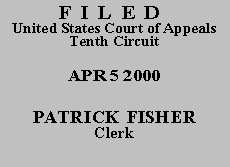

| CHOCTAW NATION OF
OKLAHOMA,
Plaintiff-Appellant, |
|
| v. | |
| UNITED STATES OF AMERICA
Defendant-Appellee. |
|
The Choctaw Nation is a Native American Indian Tribe with its principal place of business in Durant, Oklahoma. The Choctaw Nation owns and operates a variety of businesses including gaming centers, tobacco shops, truck plazas, and convenience stores. As part of its gaming activities, the Choctaw Nation sells pull-tabs at its gaming centers and convenience stores.
A pull-tab is a two inch by four inch card or ticket containing five windows covered with tabs. Various symbols are found under the tabs. The face of the pull-tab discloses the combination of symbols that results in a winning ticket. To play a pull-tab, a player simply pulls back each tab and checks the symbols found under the tabs to ascertain whether he holds a winning ticket. Depending upon the point of sale, players can purchase pull-tabs from a clerk or directly from a dispensing machine. Each pull-tab typically costs between 25 cents and one dollar, and typically allows a player to win between 25 cents and $2500. If a player purchases a winning pull-tab, he can redeem the award by presenting the pull-tab to a cashier at one of the points of sale. Although players frequently present winning tickets for payment on the date of purchase, it is not uncommon for them to claim their awards later.
The Choctaw Nation purchases pull-tabs in series of 24,000 tickets. Each ticket in a series contains the same serial number. The ticket manufacturer prints each ticket in a series with a winning or losing combination of symbols. A fixed number of tickets in each series have a winning combination of symbols, and those tickets are distributed randomly throughout the series. It typically takes the Choctaw Nation more than one business day to sell an entire series of pull-tabs. Each pull-tab also indicates how many winners there will be in each series (e.g., four $500 winners, four $75 winners, etc.). Once all of the tickets in a series are sold to players, the series is officially closed and winning tickets are no longer honored.
In April 1996, the IRS assessed against the Choctaw Nation's pull-tab activities federal wagering excise taxes, 26 U.S.C. § 4401(a)(1), and accompanying federal occupational taxes, 26 U.S.C. § 4411, in the aggregate amount of $155,316.59. The Choctaw Nation paid a small portion ($2,582.95) of the taxes determined by the IRS to be due and owing, but immediately filed a claim for a refund of this amount with the IRS. The Choctaw Nation subsequently waived its right to a statutory notice of disallowance of its refund claim and filed this action for refund. The United States counterclaimed for (1) unpaid wagering excise taxes in the amount of $149,394.47, plus interest, and (2) unpaid occupational taxes in the amount of $3,339.17, plus interest. The parties eventually filed cross-motions for summary judgment, and, pursuant to those motions, the district court granted summary judgment in favor of the government.
The issues raised on appeal by the Choctaw Nation are identical to those asserted by the Chickasaw Nation in the companion appeal. For the reasons stated in our opinion disposing of the companion appeal, we conclude the district court properly granted summary judgment in favor of the United States. In particular, we agree with the district court that (1) pull-tabs involve a taxable wager, as defined in 26 U.S.C. § 4421, (2) the Choctaw Nation is a "person" subject to federal wagering excise taxes (and the accompanying federal occupational taxes), (3) the Indian Gaming Regulatory Act does not preclude the gaming activities at issue from being subject to federal wagering excise taxes, and (4) the self-government guarantee of the 1855 treaty between the United States and the Choctaw Nation cannot reasonably be interpreted as providing the Choctaw Nation with an exemption from federal wagering excise taxes.
The judgment of the district court is AFFIRMED.
Entered for the Court
Mary Beck Briscoe
Circuit Judge
*. This order and judgment is not binding precedent, except under the doctrines of law of the case, res judicata, and collateral estoppel. The court generally disfavors the citation of orders and judgments; nevertheless, an order and judgment may be cited under the terms and conditions of 10th Cir. R. 36.3.